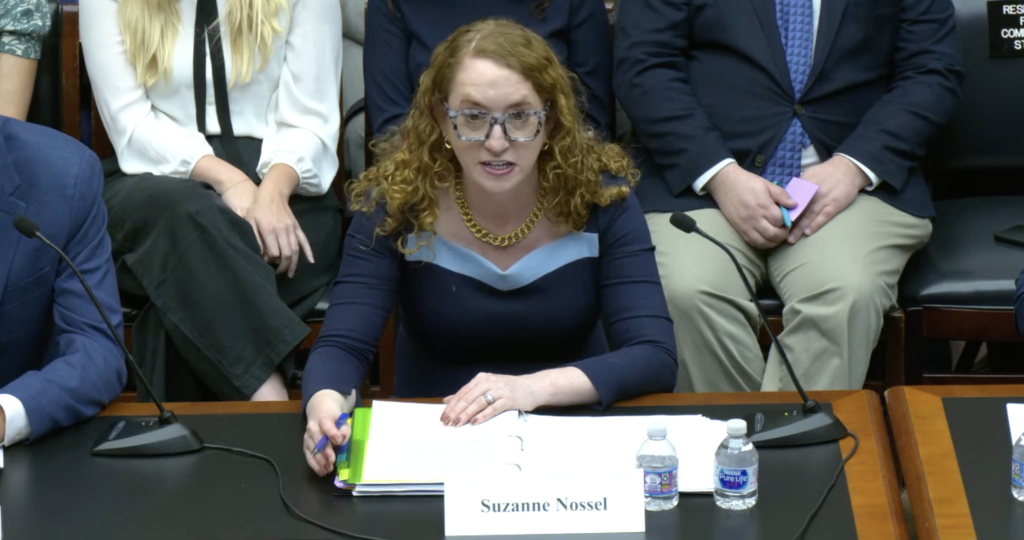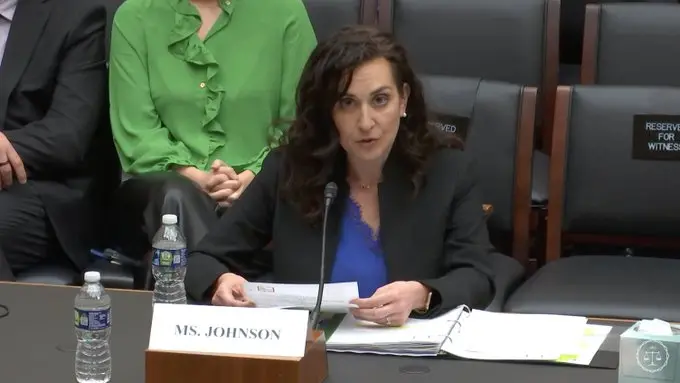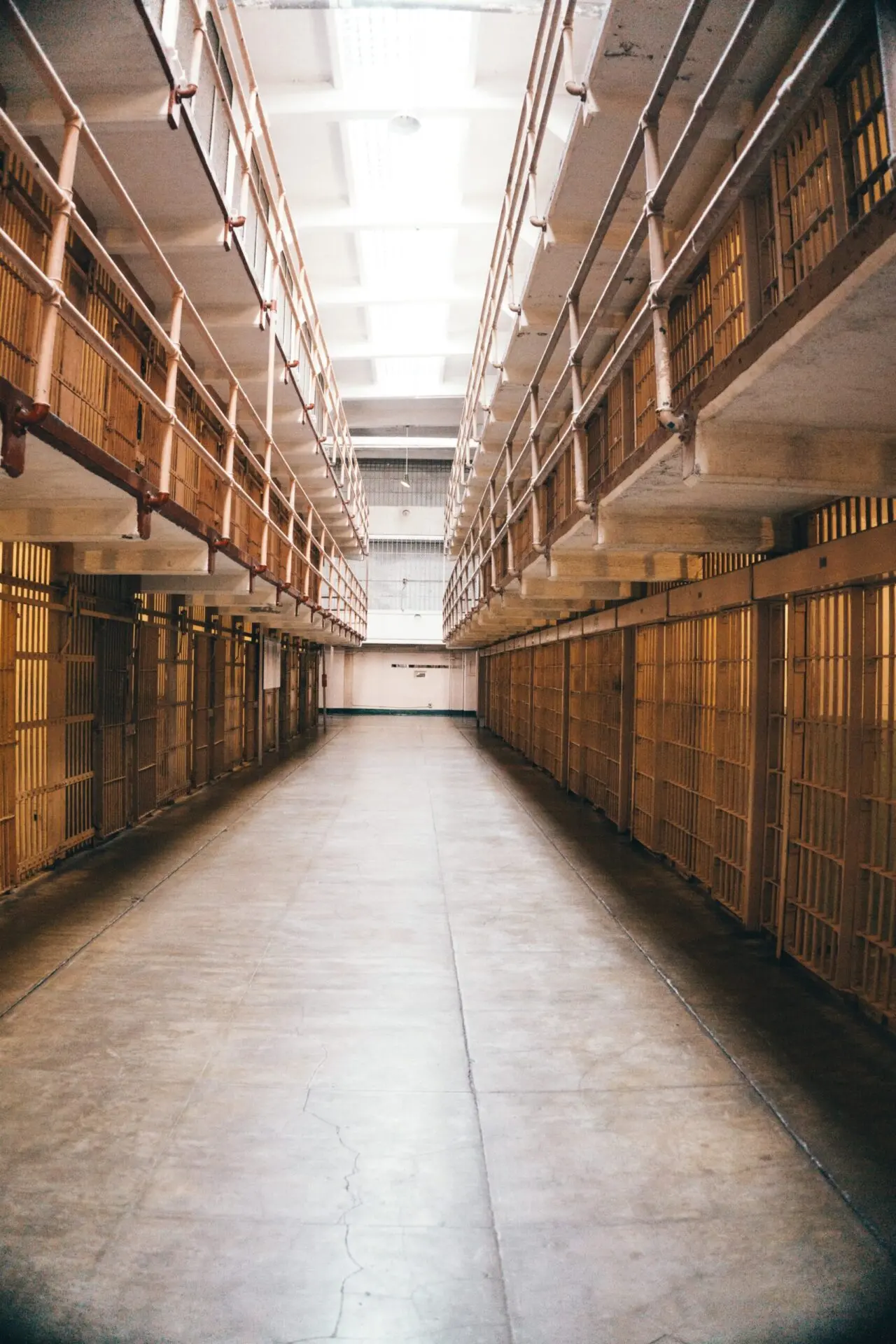
House Committee on Education and the Workforce
Subcommittee on Higher Education and Workforce Development Hearing on “Diversity of Thought: Protecting Free Speech on College Campuses” *
Statement of Suzanne Nossel, Chief Executive Officer, PEN America
March 29, 2023
Chairman Owens, Ranking Member Wilson, and distinguished members of the Subcommittee and Committee, thank you for the opportunity to testify today on diversity of thought on college campuses.
Free speech and open discourse are bedrock underpinnings of our system of government, the lifeblood of our democracy, and enablers and guarantors of other freedoms we cherish and enjoy. Before turning to the bulk of my remarks, I will offer a bit about my own background and an overview of PEN America, our mission, and work.
First, a brief introduction. I am a daughter of immigrants, a mother of a college freshman and a high school sophomore, an attorney by training, and a proud American who had the privilege of serving her country in two presidential administrations. In my career in the corporate, nonprofit, and public sectors, I have worked alongside individuals of varied political leanings. At PEN America, which I have led for the last decade, I have the privilege of continuing that effort, working to protect the foundational right to freedom of expression for all.
ABOUT PEN AMERICA
PEN America stands at the intersection of literature and human rights to protect free expression in the United States and around the globe. We are proud to be entering our 101st year. Our staying power as an organization is rooted in our nationwide membership and our solidarity with PEN writers’ organizations worldwide, but above all in our mission, which centers on the freedom to write. The PEN Charter, adopted in 1948, calls on us to uphold “the principle of unhampered transmission of thought within each nation and between all nations.” Alongside steadfast devotion to free expression, the Charter commits us to do our “utmost to dispel all hatreds and to champion the ideal of one humanity living in peace and equality in one world.” Like the framers of the United States Constitution, the authors of the PEN Charter were prescient about the threats to freedom when speech and expression are curtailed by government action.
We are a nonprofit, nonpartisan organization with an unwavering commitment to free speech, a principle that we view as an underpinning of democracy and a cause above politics. Over its century of history, PEN America has united to protect imperiled Jewish writers in Germany, championed authors imprisoned in Stalin’s gulags, and rallied behind Salman Rushdie when he was targeted by a fatwa by the Ayatollah of Iran, and again after the dastardly attack on U.S. soil that nearly took his life last summer. We championed Liu Xiaobo and launched the campaign that led to his receiving the 2010 Nobel Peace Prize. In 2015 we gave an award to the surviving staff of the satirical French magazine Charlie Hebdo and, as a result, faced a boycott from a group of our own members who believed the publication was racist and therefore undeserving of our recognition. We have defended the right of figures on both the right and the left, such as Ann Coulter, Dorian Abbot, Angela Davis, and Milo Yiannopoulos, to speak and be heard on college campuses. We are accustomed to controversy, and to taking on powerful foes.
The wide gamut of free expression issues we tackle demonstrates the depth of our commitment to our principles. We have addressed situations as varied as the impact of China’s restrictions on free speech in the mainland and Hong Kong and its rising global influence, including in Hollywood; threats to dissent in Turkey, Russia, and Myanmar; the crisis in local journalism across the United States; a culture of hostility to free expression at colleges and universities; online harassment; disinformation; attacks on press freedom; and digital transnational repression of writers, artists, journalists, and dissidents.
THE CLIMATE FOR FREE SPEECH ON CAMPUS
We at PEN America have worked extensively on issues related to campus speech since 2016, and have long expressed concern with the shrinking space for free speech in higher education. We have consistently documented mounting threats to free speech emanating from both the left and the right. As an organization of writers that treasures books and ideas, we have a deep, abiding interest in ensuring that American campuses are places where robust debate can flourish, where students can be exposed to the widest breadth of viewpoints and perspectives, and where the lodestar of openness can help point society toward innovation and progress. The university campus is the incubator of democratic citizenship and the breeding ground for leaders in every sector of society. If we don’t get free speech and open discourse right on campus, we won’t get it right in the media, in the courts, or out on the streets.
Our work in this area originally grew out of concerns that a rising generation was turning its back on the principles of free speech, calling for trigger warnings, safe spaces, and the disinvitation of campus speakers deemed controversial. We have heard from faculty members who have been challenged or even threatened with discipline in the teaching of controversial subject matter in the classroom. We have learned of speakers canceled or shouted down – sometimes by university leaders and sometimes by unruly student protests. Administrators have faced calls to purify campuses of offensive ideas. In other instances, universities have tried to restrict speech by instituting “free speech zones,” delimiting too narrowly the terrain on campus where pamphleteering or protests can occur. Some faculty have been targeted by death threats and online harassment for things they have said, and have received insufficient protection and support from their institutions in defense of their right to free expression.
For their part, students often have little awareness of the First Amendment1 or the precepts of free speech and academic freedom, sometimes believing that the best answer to noxious ideas is to shout them down, or to call on university authorities to shut them down. At PEN America we have examined these issues in depth, arguing that the essential drive to render American campuses more diverse, equitable, and inclusive need not – and must not – come at the expense of robust, uncompromising protections for free speech and academic freedom. We have pressed this case over time, beginning with a landmark 2016 report, a 2017 white paper concerning legislative efforts to regulate free speech, a March 2019 report on campus speech in a divided America, and a full online Guide to navigating campus speech controversies. We have convened summits on university campuses including the University of California at Berkeley, Middlebury College, the University of Virginia at Charlottesville, and the University of Mississippi that have been sites of high-profile controversies over free speech issues.
I and my colleagues have presented and spoken about our work on scores of college campuses and before a broad array of audiences, including the Knight First Amendment Institute at Columbia University, the Federalist Society, the Foundation for Individual Rights in Education, the Cato Institute, and academic associations such as the American Council on Education, the American Historical Association, and the American Association of Colleges and Universities. I have also written a book on this topic, Dare to Speak: Defending Free Speech for All, which centers on 20 principles for how we can live together in our diverse, digitized, and divided society without curbing free speech. We regularly issue statements on shutdowns and shout-downs of campus speakers and events and on university policies and decisions that trammel speech rights. We have spoken out forcefully against efforts to fire professors for criticizing police on Facebook, for publishing controversial ideas, for showing an image of Mohammed in an art class. We have decried student protests that went too far, such as at Yale, Stanford, and Georgetown. We have urged campus administrators not to revoke fellowships and disinvite speakers. We have insisted that they not remove art installations deemed offensive by some in the campus community or beyond. Last year I wrote a piece in the Chronicle of Higher Education about the dangers of what I termed “proxy reprisals,” namely, a practice by some universities to target those accused of offensive speech for other types of conduct as a way of circumventing the university’s obligation to protect open expression.
A central insight of our work in this area is that any effort to untangle the roots of our free speech controversies must be predicated on a full appreciation of what it means for a campus to be truly open to all ideas and perspectives. An open campus must uphold the rights of all students to participate freely and equitably. If some students, by virtue of their background, gender, race, nationality, religion, or political views feel hindered from speaking up in class or voicing their views, the marketplace of ideas suffers.
Higher education is in the midst of a dramatic demographic shift, with institutions enrolling more students of color than ever before, as well as students from immigrant backgrounds and diverse religious traditions; a sizable percentage are also first generation college students.5 This rising generation arrives to the quad with new expectations about respect for individual differences, equality, and having their voices heard. Many of these students have valid concerns about persistent manifestations of discrimination that have outlasted efforts to achieve equality on the college campus. Reporting released last year by the National Center for Education Statistics indicates that race and sexual orientation formed the two largest categories of bias driving hate crimes on campus in 2019, with the total number of hate crimes reported being highest at 4-year private and public institutions.6 Just last week the Anti-Defamation League reported a 41% spike in incidents of anti-semitism on campus in 2022.7 Sometimes calls to curtail or punish speech are borne out of a frustration that campuses have not done enough to address these persistent concerns, and that baseline rights of students to be treated equally on campus are being subsumed in favor of speech that is derogatory or intended to provoke. While such efforts to suppress speech are misguided, they cannot be effectively addressed without getting to the root of the problem and looking at the underlying concerns of equality and inclusion that motivate them. Throughout all this work, we are guided by the notion that US colleges and universities can – and must – be genuinely open to both all people, and all ideas.
EDUCATIONAL GAG ORDERS
Over the last few years, while these challenges have continued and, in some respects, intensified, we have found ourselves dealing with a new, even unprecedented threat to open discourse on campus. We have documented a spate of proposed and enacted state legislation curtailing what can be taught and studied in college and university classrooms. These laws form part of a larger wave of similar restrictions being enacted to govern what is taught in K-12 classrooms and in professional trainings for state employees that were first introduced and passed in 2021. There are currently seven laws – in Florida, Idaho, Iowa, Mississippi, Oklahoma, South Dakota and Tennessee – that we classify as educational gag orders affecting higher education; we define educational gag orders as laws that explicitly limit what can be taught and studied on campus. In the past two years these laws have sought to hinder speech on campus regarding race, sex, gender identity, or other concepts that some deem “divisive.” A few examples:
- Florida’s law, HB 7 (passed in 2022), bars public colleges from adopting instructional material that “espouses, promotes, advances, inculcates, or compels” belief in certain ideas about race, sex, color, or national origin. It mandates that classroom instruction related to past racial injustice may not “indoctrinate or persuade” students to believe these ideas. The higher education portion of this law, which also applies to private institutions, is currently stayed by a federal court.
- Mississippi’s law, SB 2113 (passed in 2022), prohibits colleges from compelling students to affirm or adopt certain ideas related to race, sex, or other characteristics, nor make “a distinction or classification of students based on account of race.”
- Oklahoma’s law, HB 1775 (passed in 2021), bans “mandatory gender or sexual diversity training or counseling” for students or “orientation or requirement that presents any form of race or sex stereotyping or a bias on the basis of race or sex” in higher education. It also prohibits schools from using specified concepts in courses.
As of March 16, there were an additional 24 higher education bills pending in the current legislative sessions in 15 states across the country. Many contain similar provisions.
As an organization that stands for open discourse, we understand and share concerns with the state of discourse on campus and the role of campus stakeholders in shaping the campus environment. On some campuses, certain DEI programs and trainings may be overly ideological or tendentious. There may be settings where students feel obligated to signal their support for particular viewpoints or perspectives or else face stigma from their classmates or even professors. I have spoken to students in these situations; it can feel like a deep betrayal of the purposes for which they came to university. It is not wrong to point out that progressive orthodoxies can sometimes stifle opposing views. But a principle isn’t a principle unless it’s extended to all. The passage of these laws is an exercise in using the power of government to apply free speech protections only to the ideas that lawmakers support, while banning and censoring outright ideas that lawmakers oppose.
If you think a pall of orthodoxy has set in on campus, the way to counter it, at least here in the United States and in light of our system and values grounded in the First Amendment, is to follow Justice Louis Brandeis’s maxim put forth nearly 100 years ago in Whitney v. California. Those behind these repressive measures have identified their version of what Brandeis once called falsehoods and fallacies; proponents of these gag orders might put “divisive concepts” or what they might call “wokeness” under those labels. But Brandeis’s answer to falsehoods and fallacies was “to expose through discussion . . . to avert the evil by the process of education.” “The remedy to be applied,” he insisted, was “more speech, not enforced silence.”
These gag orders flout that bedrock principle. They enforce silence on topics and ideas their authors disfavor. Their wording is deliberately vague, casting a willful chill on a wide swath of speech as faculty and administrators struggle to understand where the lines are drawn and what might get them into trouble.
Collectively, these bills are illiberal in their attempt to legislate that certain ideas and concepts are out of bounds. Their adoption demonstrates a disregard for academic freedom, liberal education, and the values of free speech and open inquiry that are enshrined in the First Amendment, and that anchor a democratic society. Legislators who support these bills appear determined to use state power to exert ideological control over public educational institutions. It must also be recognized that the movement behind these bills has brought a single-minded focus to bear on suppressing content and narratives by and about people of color and LGBTQ+ people specifically– something which cannot be separated from the role that racism and discrimination still play in our society and politics.
Such measures are intended not to keep speech open, but rather to put universities on notice that they are being watched and will face the consequences if their decisions fall afoul of politics. Indeed, in pushing back against orthodoxies the proponents of these measures have embraced and surpassed the very tactics they claim to decry, putting the weight not only of social pressure, but of government power, behind efforts to repress certain viewpoints.
That invocation of government power is what renders these measures so invidious. The censoriousness of students or faculty narrow-mindedly silencing speakers or colleagues is contemptible. But that activity is not backed by the power of the state, and it is often fleeting. Over time sensibilities change, political and social pendulums swing. But restrictions on speech that are cemented into law don’t just evaporate. They harden into rigid strictures that not only shut down debate, but reshape incentives in distorting ways. They set precedents that get replicated, chipping away at the reputation of US universities as the world’s most open and most desirable. It is for precisely this reason that the government prohibition of ideas was the central concern of the Founders when they wrote and adopted the First Amendment protection on freedom of speech.
These precedents can also be turned around. Today states are banning discussions of diversity, equity, and inclusion. What’s to stop states in the future from banning mention of conservative viewpoints on transgender identity, the validity of affirmative action, or the idea that life begins at conception? For politicians to arrogate the power to dictate what can and cannot be taught could risk putting all kinds of issues and topics out of bounds.
Proponents of educational gag orders are not wrong to call out elements of diversity, equity, and inclusion initiatives when they veer into the outright suppression of speech and ideas. Progressives too often forget that the movements they wage — whether for racial justice, gender justice, climate or anything else — depend upon free speech protections to guarantee the space for dissent, and that such protections must apply equally to speech with which they disagree. Some fail to acknowledge, too, that worthwhile perspectives and solutions can emerge from outside their own ideological comfort zones.
But the cure offered by these gag orders — intrusive legislation to muzzle the opposite set of views — is significantly worse than the disease. State-ordered legal bans based on viewpoint — whether ideas on race or diversity programs — strike at the heart of what the First Amendment protects.
This year, we are also seeing a spate of alarming new tactics being introduced to curtail academic freedom and open discourse on campus, tactics that infringe on the autonomy of educational decisions at universities and risk simply substituting one set of constraints on viewpoint diversity with another. These include:
– The takeover of the public New College of Florida by a group of out-of-state trustees connected with the Governor’s political agenda, appointed by him to remake the university, purportedly in the image of a Christian private college. The new trustees have fired the president, driven away the provost, and removed several other senior administrators in a mission to “liberate the campus” from “cultural hostage takers.”
– The Florida state legislature has advanced a bill, HB 999, that would ban state universities from using funds for DEI and abolish courses of study that include gender studies, critical theory, including theories on race, gender, ethnicity and social justice. The measure would also require political appointees to rewrite university mission statements, ban “theoretical” or “experimental” courses from general education, and pare back the protections of faculty tenure.
– A set of proposed bills in Texas, SB 16, 17, and 18, would ban faculty tenure and insert governing boards into approving every job announcement and course description. They would also create a statewide blacklist for faculty or staff determined by political appointees to have violated vague prohibitions on DEI, banning them from employment in Texas public higher education.
These censorious measures reveal an underlying problem with the approach now being taken to issues of campus viewpoint diversity and free speech. Fundamentally, these vital goals are ones that will not be advanced by legislation. Those who believe in free speech and the First Amendment understand that its essence lies in restricting the power of government to meddle in the marketplace of ideas. When it comes to campus free speech, there are multiple reasons why legislative intrusion is misguided, and risks setting back the very causes it purports to advance:
- It applies a one-size-fits-all approach – Every college and university has its own history, culture, population, geography, areas of academic emphasis, and challenges. This is a hallmark of the United States’ decentralized educational system. Our state educational systems include everything from Research 1 universities to small community colleges. Blanket legislation dictating what can be taught or said across every campus in a state denies this distinctiveness, imposing made-in-the-statehouse solutions that can stoke tensions, chill speech, and even intensify the propensities they are intended to counter.
- Substitutes political for educational judgment – Faculty and university leaders are experts in education and standard-bearers of the scholarly disciplines at the heart of university life. They are best placed to determine, through a process of shared governance, how to uphold free expression and viewpoint diversity on their campuses. To override their judgment through legislation inserts politics into intellectual life and violates the sanctity of the university as an environment where free inquiry is safeguarded from the distorting influence of political motives.
- Alienates students – An approach that privileges the speech of some over that of others runs the significant risk of feeding student perceptions that the First Amendment is nothing more than a political tool wielded by the powerful to suppress disfavored viewpoints. By fostering such cynicism, educational gag orders risk compounding the problem of a rising generation that is alienated from the principle of free speech and ready to sacrifice it in the name of other values. By fueling such perceptions, we will surrender the chance to persuade skeptical students that the First Amendment is a constitutional protection that serves us all in a democratic society.
- Adds another burdensome layer of oversight – Adding legislative review bodies and other forms of enhanced government oversight, as many of these laws and bills do, only adds to that weight, bearing down on the open, freewheeling, and innovative character of a thriving campus. To the extent that administrators are failing to uphold their obligations to support ideologically diverse student groups and speak up in defense of free speech, further intimidating and disempowering them through the heavy hand of government oversight will compound rather than solve the problem.
- Enhances polarization – While questions of speech implicate power and politics, it is essential that free speech on campus not become a politicized or partisan issue. The First Amendment leans neither left nor right. It is a cause above politics. But new forms of legislation inject politics into the heart of academia. Universities, like our larger society, are increasingly cordoned into ideological camps. To the extent that faculty and students are put into the position of policing one another’s adherence to legislative restrictions on teaching and learning, those fissures will deepen. The value of intellectual diversity lies not in campus constituents talking at or past one another, but rather in genuine intellectual exchange. That exchange depends upon a measure of trust and civility that underpins a campus community. Prospects for authentic intellectual give-and-take diminish when the campus becomes an environment where snitching and retaliation are rewarded and encouraged, and where some ideas and expressions are favored over others by legislative fiat.
These bills are not about achieving diversity of thought on campus. They are about exposing and intimidating people with particular viewpoints and ideas.
As an organization that works to defend freedom of expression both in the U.S. and globally, PEN America is especially attuned to the ways in which these efforts also represent worrying echoes of educational censorship enacted by oppressive regimes around the world. Hungarian Prime Minister Viktor Orbán revoked accreditation and funding for gender studies programs in 2018, and expelled the prestigious Central European University (CEU) from Hungary shortly thereafter. His assault on higher education was part of a larger crackdown on independent media and civil society; at the time, PEN America called the expulsion of CEU evidence that the Hungarian government was “hostile to academic freedom and freedom of thought.” Similar tactics risk taking the U.S. down an alarming path.
Escaping this escalating tit-for-tat battle of assaults on speech on U.S. campuses will demand leadership across the political spectrum. University leaders need to resist intrusive legislation that micromanages curriculum and undercuts academic freedom. University presidents also need to insist and ensure that all viewpoints — left and right alike — get a fair hearing on campus. Collectively, they need to get to the root of the problem, which includes serious disparities in ideological representation in many fields of inquiry, not just in terms of who is on the faculty, but as reflected in who enrolls in courses, completes terminal degrees, and is available to teach. Until those pipelines are built, ideological diversity on campus will continue to lag. Efforts to foster diversity, equity and inclusion on campus should span the gamut of individual differences – racial, socio-economic, religious, ethnic, ideological, gender-based, political and more.
Progressive leaders need to draw the line at approaches that seek to muzzle criticism, including through demonization and stigmatization that make the cost of raising questions too high. Conservatives need to reject an approach that meets informal chilling of speech with out-and-out government censorship. Education officials should inculcate and incentivize college leaders, administrators, and faculty to maintain a campus open to all views, rather than responding to the exclusion of ideas they like with laws prohibiting those they don’t. Attaining all forms of diversity, including diversity of viewpoints, should be a priority across every area of the university, from faculty hiring committees to student life administrators. These adaptations are critical as an economic issue as well; the stifling approach to higher education we are now seeing threatens the reputation of U.S. colleges and universities as global leaders in open intellectual exchange and innovation.
We also need to introduce the norms and ideals of free speech to all students through freshman orientation seminars or courses that expose them to the value of freedom of expression and teach them how to uphold it on campus, whether in the lecture hall or while mounting a protest. This imperative has spurred PEN America to launch free expression institutes for youth, and we are exploring opportunities with universities to bring these institute programs to campus.
This escalating battle for control over free expression in education should worry all those who care about free speech, no matter their politics. Some on the left have grown too quick to want to silence those who offend or threaten them. Some on the right are going a major step further, legitimizing the use of government power to render certain curricula, ideas and viewpoints off-limits. The greatest casualty in this battle may be neither progressive nor conservative ideas, but the principle of free speech itself.
Thank you to the committee for looking into this vital set of issues, and for the opportunity to testify. I look forward to answering any questions you may have.










